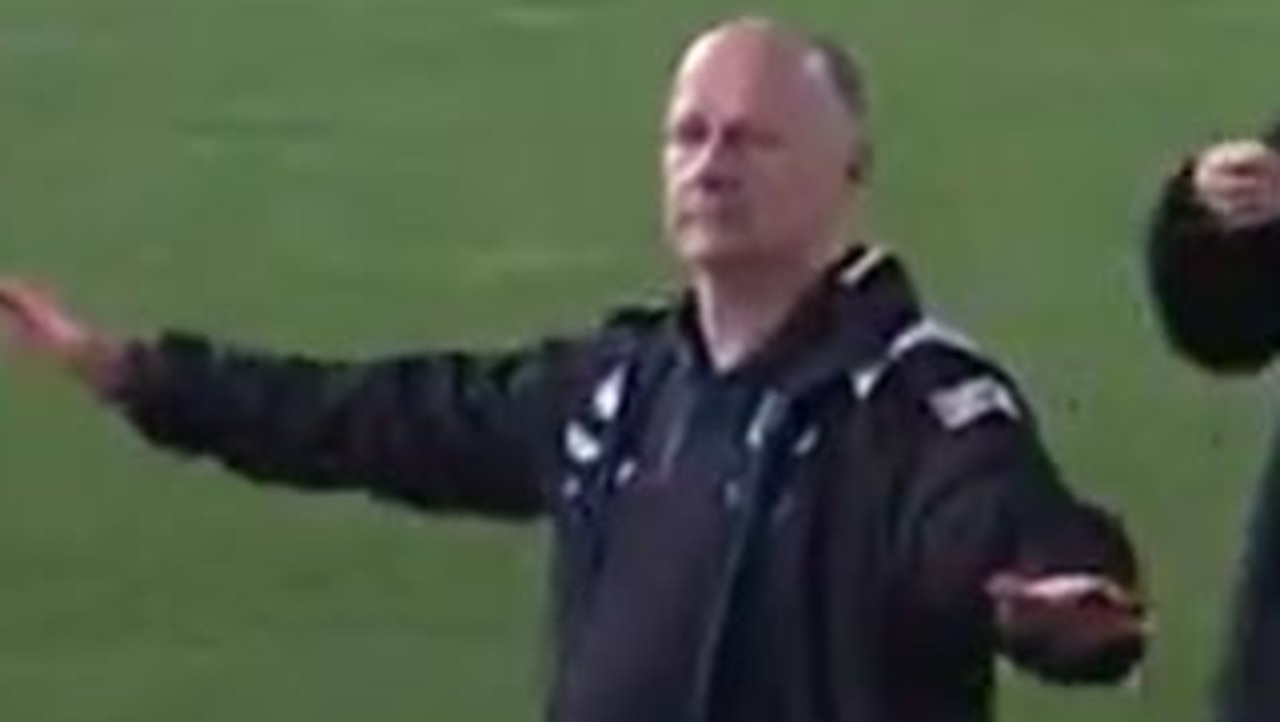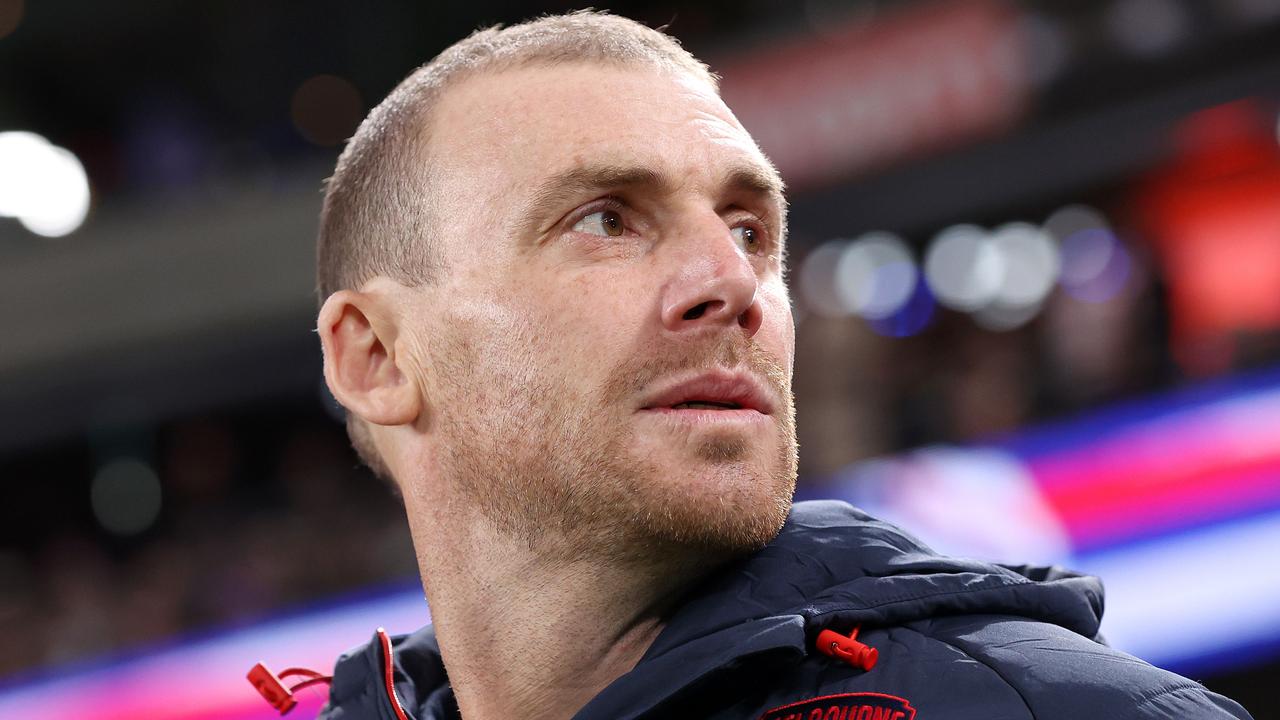How Kevin Sheedy opened the gateway to the African dream and the magic it brings to our game
Few know the name Goaner Tutlan. But the former child soldier — with the help of Kevin Sheedy — paved the way for today’s African AFL stars, Mark Robinson writes.
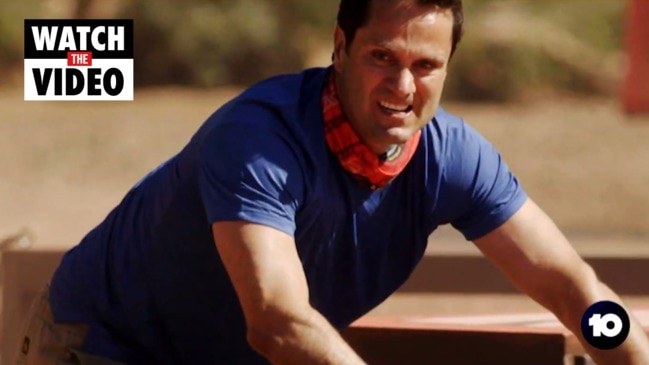
AFL News
Don't miss out on the headlines from AFL News. Followed categories will be added to My News.
Kevin Sheedy, as he does, was talking to his taxi driver late Wednesday afternoon.
“I’m in a taxi, driven by a young man from Sudan and we’re talking about the wonderful opportunities in life and he can’t believe it, this guy,’’ Sheedy enthused.
“He’s loving it. He understands what I’m saying about bringing people out here and showing them AFL.
“It’s a freak of nature … you’re talking to me about players from Africa and I’ve got a Sudanese taxi driver.’’
Sheedy would have a conversation with a pilgrim at Jerusalem’s Wailing Wall or a boatman off Mozambique if they wanted to listen to him talk about Australian rules and the great country down under.
Because that’s what Sheedy’s does.
Stream selected Fox Footy shows on Kayo Freebies completely free this June including AFL 360, On The Couch, Bounce & more. No Credit Card. No-brainer. Register Free Now
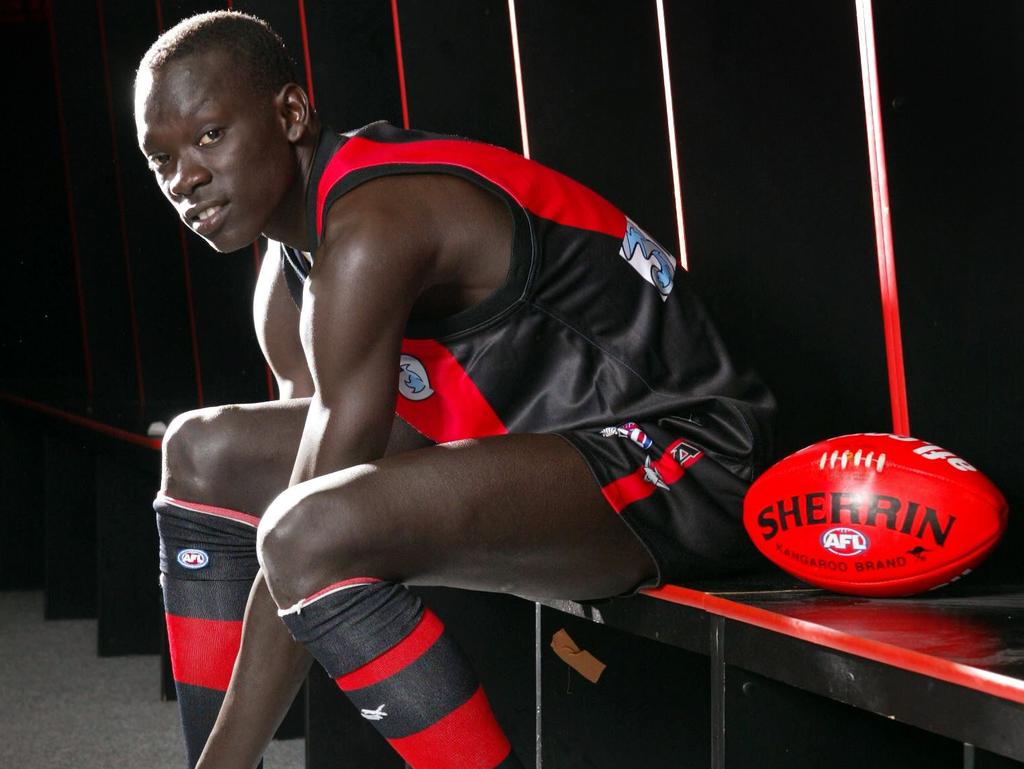
He is a Legend of the AFL, but a much more adequate description would be visionary of the AFL.
He is celebrated for helping discover indigenous talent, but he should also be acknowledged as the first AFL coach to open the pathway for East Africans.
In 2004, he invited 22-year-old Goaner Tutlan to be part of Essendon’s development squad.
Goaner never made the Bombers list, but the former child soldier — as a nine-year-old, he patrolled the Ethiopia-Sudan border armed with an AK-47 machine gun — was given an opportunity.
At the time, they said Sheedy was mad, a PR sniffer. Now, as more and more Africans make their way to Australian rules, they would take back their words.
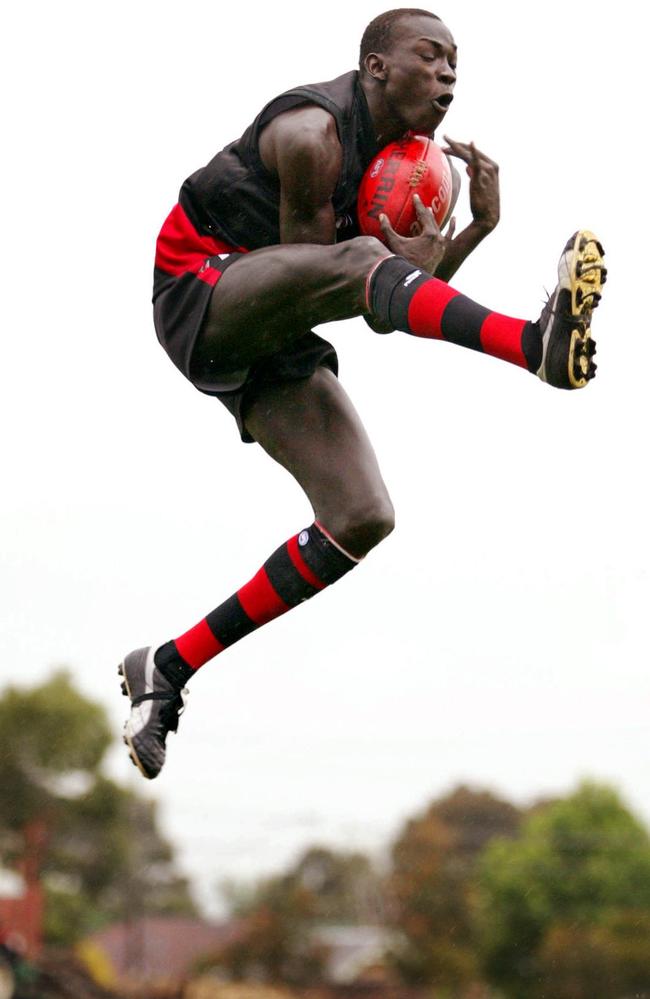
“Of course I remember him,’’ Sheedy says.
“I’m always looking for opportunities. We had an African American at Essendon and I remember thinking, ‘can he really do this, this kid?’
“With Goaner, it’s no different than looking at Israel Folau.
“If you stop looking, you’re finished.
“I’m always trying to find opportunities when people have told you, ‘no, you’re kidding yourself, you’re a dreamer’.
“Sometimes, people just don’t get it. We’ve battled with our own native people and treated them ordinarily for decades, and we’ve come a long way in the past 30 years, haven’t we?
“It’s about opening up people’s thinking, that’s what I’m about. It doesn’t matter to me, as long as other people follow the journey.’’
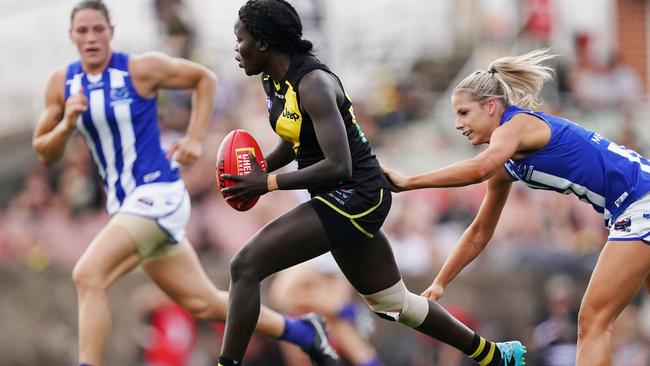
They have. Thirteen players with African heritage are on AFL lists, led by Majak Daw, Aliir Aliir and Changkuoth Jiath, and another 25 are playing in the boys and girls NAB leagues, some of whom will be drafted this year. African dreams, Sheedy said, are devouring opportunity.
“I think the Hawthorn lad, CJ, is fantastic,’’ Sheedy said.
“Sam (son) and I sit at home and we love watching him. I watched him in Round 1 this year and the only player turning up for four quarters was him.
“He was brilliant. I said to Sam … how, what, who, but where are some more.’’
In January this year. Sheedy attended the AFL World Nines competition played in Box Hill, where a dozen countries were represented.
“I just try to help them’’ he said.
“I promote them, and give them belief that an old fox would come down and look at them. Guess what? The South Sudanese won. I’ll send you a photo.”
Asked what he admires most about the Africans, he said: “I see excitement. I get excited about most nations with what talent they have. You see the magic from any great soccer player from any country and I say, ‘bring some of it to our game’. We can train them to play AFL. That’s what we’re doing now.
“The next 25 years is important to our country. We must welcome them into our country and show them the greatest game of football, called Australian rules, which we have.
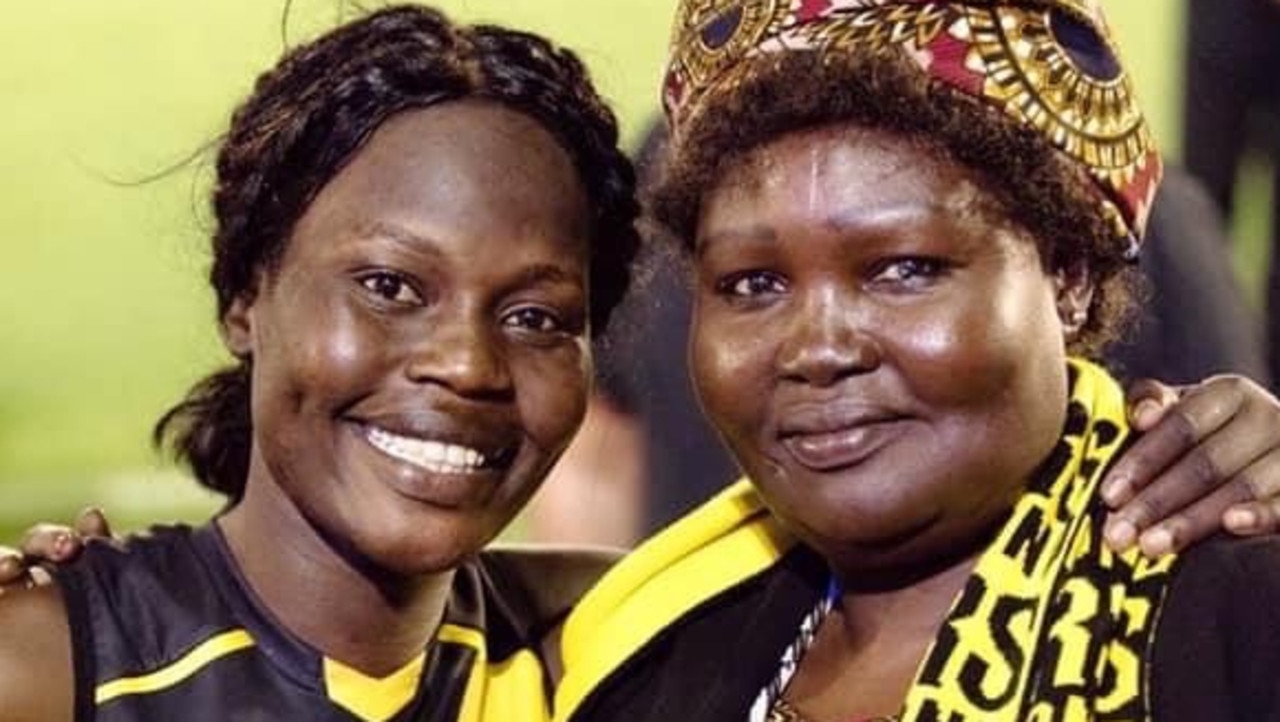
One of the more inspirational stories, he said, was Richmond AFLW player Akec Makur Chuot, from southern Sudan.
“She left South Sudan and went to Kenya for eight years and was in a refugee camp,’’ he said.
“Her story by far is the most brilliant story through hardship to get somewhere in AFL footy. It’s an amazing story.
“I wrote her in my book and I put her story next to the story of Erin Phillips. What a contrast. There’s a story about the daughter of Greg Phillips and a story about a girl out of a refugee camp in Kenya.’’
Twice Sheedy has been to South Africa with the AFL Academy squads and their families, and a bunch of AFL people including officials and former players and coaches, like Matthew Lloyd and Nathan Buckley.
It was a trip to inject an “earthiness” into the younger players. For Lloyd, the retired Bomber, it was entirely different. He was half-mauled by a Lion, but that’s another story.
Of course, Sheedy helped run footy clinics for the locals.
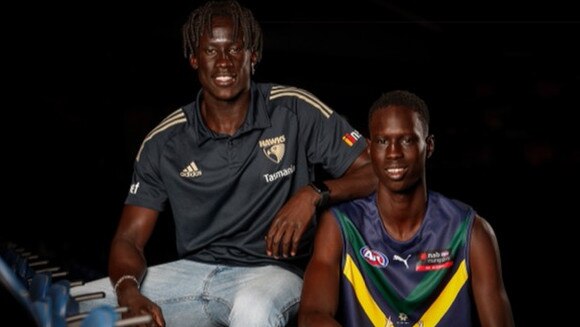
“You know, one young guy made one of the greatest comments you could make about our game,’’ Sheedy said.
“He said, ‘your game is freedom and you run with wind in your face’. What a great comment that is. Have a look at CJ.’’
Giants chief executive David Matthews was part of two Academy visits to South Africa and witnessed — and has witnessed during Sheedy’s time at the Giants — a man of incredible energy for football.
“He sees possibility everywhere and wherever he is,’’ Matthews said.
“Be it in an indigenous community, in western Sydney meeting Muslim communities, whether he’s in Africa looking at the potential in a country full of cricket and rugby grounds, he says they can all fall in love with our game.
“He’s the most optimistic and ambitious person. He doesn’t see boundaries and that’s why he is a bar of gold for the game and for this country.’’
AFL talent ambassador Kevin Sheehan agrees: “He’s been that way to the indigenous, the Americans, the Irish, the Africans and just about every group because he loves the game.
“He just thinks the world should be allowed to play our game, particularly those who come into our country. He’s a marvel and we’ve been following his lead.”
Sheehan’s African trailblazer is Majak Daw.
He first saw Majak play when he was at the Western Jets. He received a call from Jets manager Shane Sexton, who was the manager of the Western Jets and who had that tantalising phrase: ‘We might have one here’.
Sheehan was intrigued. Could an African be drafted?
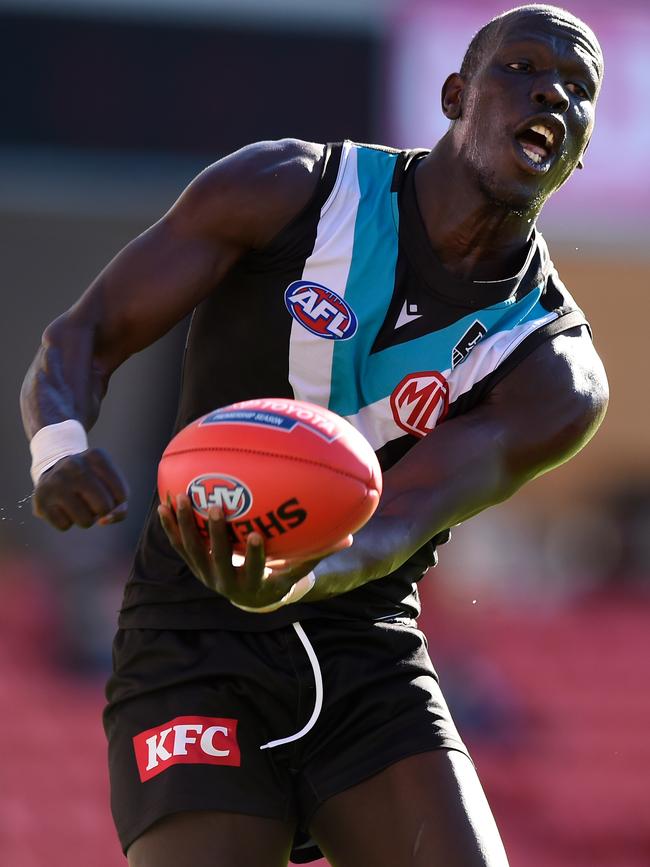
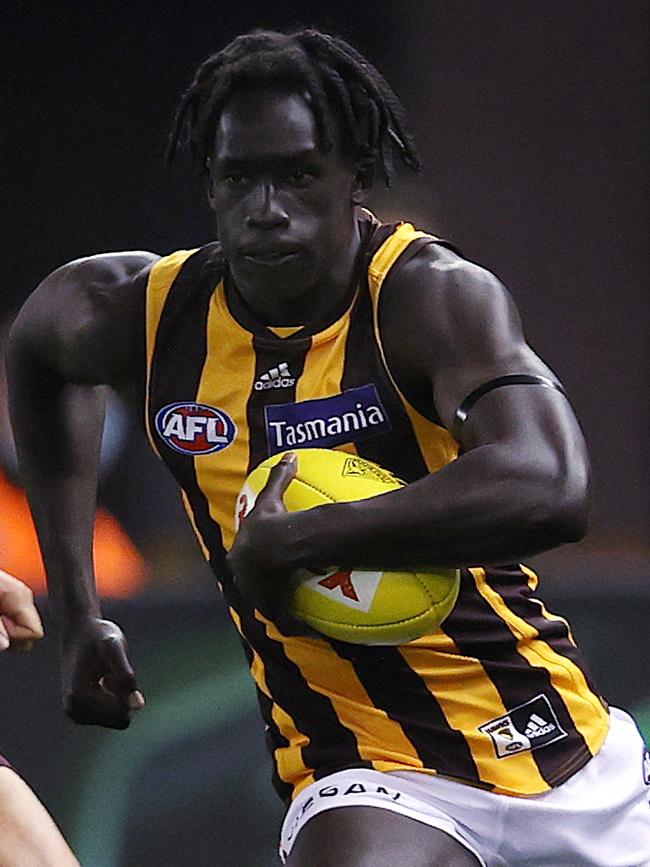
“I went to Werribee to watch him play, they were playing the Geelong falcons. It took awhile because they were getting a bit of a hiding and he was at full-forward, on the bench, and I was hoping for a moment.
“There was a moment all right. He stood on someone’s shoulder and took the mark of the day and a moment later, took two bounces and kicked a goal. It was all I needed to see.’’
The AFL awarded Majak the Mike Fitzpatrick Scholarship.
Sheehan, and others, explored the African communities in Melbourne. He met players and parents and heard remarkable stories of hardship from the home countries, and from the displaced in refugee camps.
“It’s been unbelievably challenging for their families,’’ he said.
“They came out here and their priorities are very different to the boys and girls born in this country. We are privileged to play sport from six yeas of age and then join a club.
“These kids, many of them into teens and lived three or four years in refugee camps, when they get here, it’s not the priority of their parents to get them into sport, it’s about earning a living and earning money.’’
Sheehan sees a heap of talent in the NAB leagues.
He nominates Mac Andrew, who is playing for the Dandenong Stingrays, as an exciting prospect. Mac was born in Egypt and has from Sudanese parents. He is 200cm and already in Australian under-17 squad.
“He can jump, he can ruck, he can play forward, he can play back, he will play Vic Country at the nationals later this year.’’
He is a Next Gen Academy boy tied to Melbourne. That means if there is a bid for Mac in the top 20 selections, the Demons can’t match the bid. After that, and if they want him, he will be a Demon.
“I’ve seen his father at the footy, he sits there very quietly watching his boy, and it reminds me of that ad on TV.’’
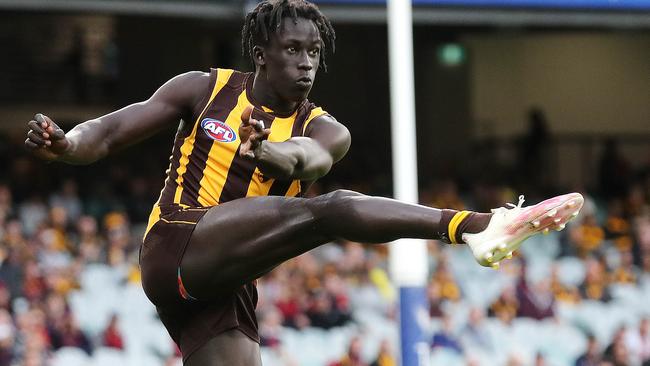
Sheehan is talking about the Google advert. The one about the young girl and how dad searches Google for where to buy a Sherrin, how to strap ankles and what is a blinder.
“It’s a brilliant and all those boys and girls would struggle with language that we talk in footy,’’ he said.
“The blinder … this kid has had some blinders this year.
“I see a lot of those stories. I love that ad. I watch it every time it’s on. You keep thinking about the blinder moments we’re all going to see. Mac looks like a unique talent.’’
What footy is being presented with, post Majak, is a more rounded African player. It is very noticeable in the NAB leagues, Sheehan said.
Majak and the athleticism, build and the aerial explosion, but he lacked some footy IQ, that awareness, reaction and the speed of the game which demands sharp decision-making.
Look at CJ and Aliir and the young Fredericks twins at Port Adelaide and Fremantle, which is another remarkable story.
“The game is being so quick the lightning reflexes are needed,’’ Sheehan said of the south Sudanese.
“They have leg speed. They might not have the endurance of the Kenyans, but gee they have the speed of the south Sudanese and the power.
“All of them are quick and have great leaps and they have great vision. Their reaction time is quick. We see that with CJ, he’s preparedness to take the game on and break lines.
“We put him in the national Academy and in training sessions he was against the best kids in Australia and he looked very much at home. He got better training with the best kids.’’
Sheehan exudes astonishment at the prospect of Aliir becoming an All Australian. What a story, he said. In Sheedy’s corner, he saw it coming before we had seen the likes of Majak, Aliir Aliir, Mabior Chol and CJ.
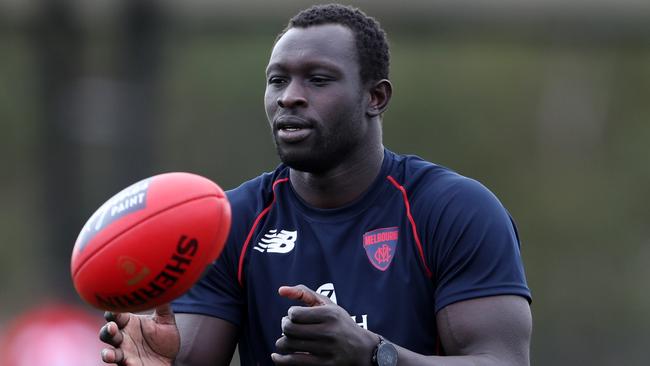
Clearly, from opportunity big things grow.
Sheehan hopes to have 30 African on male playing lists by 2030. The past two years, however, have presented problems because Covid.
“I was talking to our people in the west suburbs and they have been dislocated for a year and half without playing community footy in Melbourne,’’ he said.
“Not many are playing at the moment. They started to play but they’ve gone off to do other stuff. We’ve got to get them re-engaged.’’
Sheedy’s vision did not stop with Goaner Tutlan. In late 2005, Sheedy invited two Japanese players to train at Essendon and gave one of those players, Michito Sakaki, a quarter of a game in a pre-season match against Sydney at North Sydney Oval.
“I begged, stole and borrowed from the AFL that this guy had to be given a chance,’’ Sheedy said.
“The AFL said he wasn’t a listed player, that he wasn’t insured, but I said we could do all that, just sign the paper, suck it up and get over it and he’s now the president of the Tokyo Giants.’’
The Japanese experiment has not followed the African dream — yet.
“In the near future, I believe that a Japanese playerwill debut in an AFL game,’’ Sheedy said.
“The landscape is changing enormously and quickly. We‘re seeing that with the African boys and girls.’’
More Coverage
Originally published as How Kevin Sheedy opened the gateway to the African dream and the magic it brings to our game




